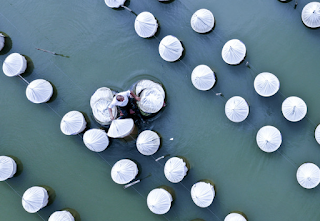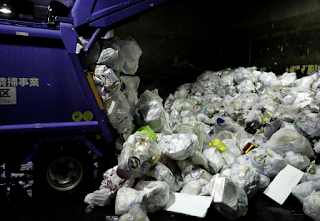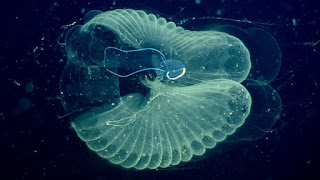2019 was an eventful year for ocean conservation. Below are our picks for the top 13 stories of the year. What do you think should be number 14 and 15?
1. CITES conference responds to the extinction crisis by strengthening international trade regime for wildlife
 The 2019 CoP CITES attendees decided to add 18 more shark species to Appendix II. They include shortfin and longfin mako sharks blacknose and sharpnose guitarfishes, which are highly valued for their fins. Wedgefishes and sea cucumber species were also listed in Appendix II. Read more on the Sea Save website: Here
The 2019 CoP CITES attendees decided to add 18 more shark species to Appendix II. They include shortfin and longfin mako sharks blacknose and sharpnose guitarfishes, which are highly valued for their fins. Wedgefishes and sea cucumber species were also listed in Appendix II. Read more on the Sea Save website: Here
———————————————–
2. More than 11,000 scientists renew warning: Earth faces a climate emergency
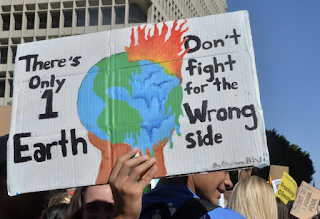 Scientists have a moral obligation to clearly warn humanity of any catastrophic threat and to “tell it like it is.” On the basis of this obligation and the graphical indicators presented below, we declare, with more than 11,000 scientist signatories from around the world, clearly and unequivocally that planet Earth is facing a climate emergency. Exactly 40 years ago, scientists from 50 nations met at the First World Climate Conference (in Geneva 1979) and agreed that alarming trends for climate change made it urgently necessary to act.
Scientists have a moral obligation to clearly warn humanity of any catastrophic threat and to “tell it like it is.” On the basis of this obligation and the graphical indicators presented below, we declare, with more than 11,000 scientist signatories from around the world, clearly and unequivocally that planet Earth is facing a climate emergency. Exactly 40 years ago, scientists from 50 nations met at the First World Climate Conference (in Geneva 1979) and agreed that alarming trends for climate change made it urgently necessary to act.
Editorial Note: A Sea Save Foundation advisor, Carlos De La Rosa is one of the signatories on this declaration.
3. A wave of youth activism emerges. New voices decry the need for science and action to protect our planet.
 2019 saw a wave of young people getting involved in the climate conversation. Sparked by 16-year-old environmental activist Greta Thunberg who addressed heads state at a United Nations summit. This culminated in UN Secretary-General Antonio Guterres calling on countries to step up commitments to reduce their dependence on fossil fuels. “We face at least 3 degrees celsius of global heating by the end of the century,” he said. “I will not be there, but my granddaughters will. And your grandchildren, too. I refuse to be an accomplice in the destruction of their home and only home.”
2019 saw a wave of young people getting involved in the climate conversation. Sparked by 16-year-old environmental activist Greta Thunberg who addressed heads state at a United Nations summit. This culminated in UN Secretary-General Antonio Guterres calling on countries to step up commitments to reduce their dependence on fossil fuels. “We face at least 3 degrees celsius of global heating by the end of the century,” he said. “I will not be there, but my granddaughters will. And your grandchildren, too. I refuse to be an accomplice in the destruction of their home and only home.”
 Tepco is considering a plan to dump roughly 1 million cubic meters of treated radioactive water — enough to fill 400 Olympic-size swimming pools — from the wrecked Fukushima Dai-Ichi nuclear power plant into the Pacific Ocean, part of its nearly $200 billion effort to clean up the worst atomic accident since Chernobyl. Storage tanks at the site are forecast to be full by mid-2022, and space for building more is scarce. Scary as it sounds, discharges are common practice in the industry and would likely meet global guidelines.
Tepco is considering a plan to dump roughly 1 million cubic meters of treated radioactive water — enough to fill 400 Olympic-size swimming pools — from the wrecked Fukushima Dai-Ichi nuclear power plant into the Pacific Ocean, part of its nearly $200 billion effort to clean up the worst atomic accident since Chernobyl. Storage tanks at the site are forecast to be full by mid-2022, and space for building more is scarce. Scary as it sounds, discharges are common practice in the industry and would likely meet global guidelines.
 Fishing is a way of life for coastal communities around the world. An estimated four million fishing vessels sail the world’s oceans, providing fish for a global seafood market valued at over $120 billion. “It’s hard to overstate the importance of fish,” says Nick Wise, CEO of the nonprofit organization OceanMind. “There are three billion people in the world who rely on seafood as their primary source of protein, mostly in developing nations. Twelve percent of the world’s population relies on the wild-capture seafood industry directly or indirectly for their livelihoods.”
Fishing is a way of life for coastal communities around the world. An estimated four million fishing vessels sail the world’s oceans, providing fish for a global seafood market valued at over $120 billion. “It’s hard to overstate the importance of fish,” says Nick Wise, CEO of the nonprofit organization OceanMind. “There are three billion people in the world who rely on seafood as their primary source of protein, mostly in developing nations. Twelve percent of the world’s population relies on the wild-capture seafood industry directly or indirectly for their livelihoods.”Sea Save Foundation Editorial – Is this sustainable?
Read more from “Microsoft”
———————————————-
6. First whales harvested as Japan resumes commercial whaling
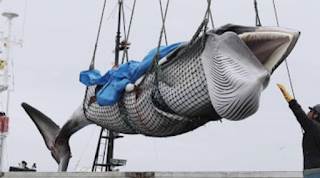 After more than 30 years Japan resumed commercial whale hunting, defying calls from the international community to protect animals once hunted to the brink of extinction. Now whalers, who have long depended on government subsidies for their survival, face the much tougher challenge of defying basic economic reality: The market for their product is declining while labor costs across the nation are on the rise.
After more than 30 years Japan resumed commercial whale hunting, defying calls from the international community to protect animals once hunted to the brink of extinction. Now whalers, who have long depended on government subsidies for their survival, face the much tougher challenge of defying basic economic reality: The market for their product is declining while labor costs across the nation are on the rise.
7. World Economic Forum: China can play a pivotal role in ocean conservation
An industrial revolution is beginning in the oceans. Historically, the most valuable commodities drawn from the sea were products like cod, pearls, and sponges. The currencies of this new ocean economy are different: kilowatts of energy, shipping containers, metals, data, desalinated water, DNA, and oil, to name a few. The marine industrial economy has been valued at $1.5 trillion and is predicted to grow at double the rate of the rest of the global economy by 2030. A sometimes unappreciated aspect of this recent explosive industrial marine growth is that its distribution is highly uneven. In fact, many key facets of the new ocean economy have been dominated by one nation: China.
 Dozens of medical and public health groups are calling on elected officials and candidates to commit to an agenda to combat climate change.“The health, safety and well-being of millions of people around the world have already been harmed by human-caused climate change, and health risks in the future are dire without urgent action to fight climate change,” the 74 groups, including the American Medical Association and the American Heart Association, said in a letter Monday.
Dozens of medical and public health groups are calling on elected officials and candidates to commit to an agenda to combat climate change.“The health, safety and well-being of millions of people around the world have already been harmed by human-caused climate change, and health risks in the future are dire without urgent action to fight climate change,” the 74 groups, including the American Medical Association and the American Heart Association, said in a letter Monday.———————————————–
9. G20 (twenty countries with the largest economies in the world) to tackle ocean plastic waste
Governments around the world commit to crack down on plastic pollution. Images of plastic debris-strewn beaches and dead animals with stomachs full of plastic have sparked outrage, with many countries, including more than two dozen in Africa, banning plastic bags outright. The EU has voted to outlaw 10 single-use plastic items, including straws, forks and knives, by 2021. It has also set targets for all plastic packaging, the top source of plastic waste, to be recyclable by 2030.
Anela Choy studies the things that deep-sea creatures eat, which means that, in effect, she is often studying plastic. Over the years, pieces of debris would show up again and again in the stomachs of certain fish, species that rarely come to the surface to feed. The plastic, she realized, must be going down to them. Microplastics—tiny pieces less than five millimeters in size—have largely been studied as a problem of the ocean surface. Plastic tends to be buoyant, the thinking goes, and the ocean surface is frankly easier to study.
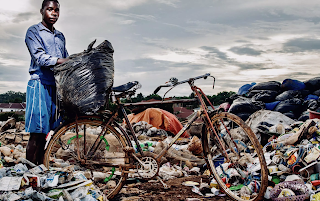 As of June 1, travelers to Tanzania will have to pack very carefully. The country announced the implementation of the second phase of its plastic bag ban on May 16. Visitors are advised to avoid packing or carrying any plastic bags as they’ll have to leave these at a designated desk in the airport. The first phase of the country’s anti-plastic initiative began in 2017 to “protect the youth and environment,” with an initial ban on the manufacture of plastic bags and in-country distribution.
As of June 1, travelers to Tanzania will have to pack very carefully. The country announced the implementation of the second phase of its plastic bag ban on May 16. Visitors are advised to avoid packing or carrying any plastic bags as they’ll have to leave these at a designated desk in the airport. The first phase of the country’s anti-plastic initiative began in 2017 to “protect the youth and environment,” with an initial ban on the manufacture of plastic bags and in-country distribution.
Dateline 27 March 2019: The European Parliament has approved a law to ban single-use plastic by 2021 in the EU. The ‘Single-Use Plastics Directive’ puts in place more responsibility for plastic producers and new recycling targets for EU member States. The law recognizes plastic as “increasingly ubiquitous in everyday life,” and states that plastic’s growing use in short-lived applications “which are not designed for re-use or cost-effective recycling, means that related production and consumption patterns have become increasingly inefficient and linear.” The law describes the European Strategy for Plastics as a “step towards establishing a circular economy in which the design and production of plastics and plastic products fully respect reuse, repair and recycling needs and in which more sustainable materials are developed and promoted.”
13. United Nations Secretary-General: ‘We are doomed’ without significant action on climate change
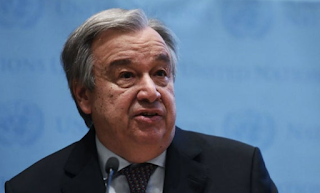 United Nations Secretary-General, António Guterres, said in a new interview that “we are doomed” without actions to prevent greenhouse gas emissions. “We need to have the big emitters understanding that their role is essential, because if the big emitters fail, everything will fail,” Guterres told Reuters at a climate conference in Madrid. “If we just go on as we are, we are doomed,” he added. Guterres also said major emitters should show they will be more ambitious next year and “hopefully” commit to net-zero carbon emissions by 2050. “History cannot accept that my generation will betray our children and grandchildren,” he said, according to Reuters.
United Nations Secretary-General, António Guterres, said in a new interview that “we are doomed” without actions to prevent greenhouse gas emissions. “We need to have the big emitters understanding that their role is essential, because if the big emitters fail, everything will fail,” Guterres told Reuters at a climate conference in Madrid. “If we just go on as we are, we are doomed,” he added. Guterres also said major emitters should show they will be more ambitious next year and “hopefully” commit to net-zero carbon emissions by 2050. “History cannot accept that my generation will betray our children and grandchildren,” he said, according to Reuters.

